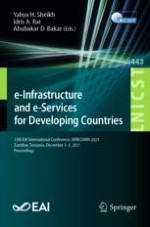2022 | OriginalPaper | Buchkapitel
The Effectiveness of Game-Based Learning Application Integrated with Computational Thinking Concept for Improving Student’s Problem-Solving Skills
verfasst von : Syamsul Bahrin Zaibon, Emram Yunus
Erschienen in: e-Infrastructure and e-Services for Developing Countries
Aktivieren Sie unsere intelligente Suche, um passende Fachinhalte oder Patente zu finden.
Wählen Sie Textabschnitte aus um mit Künstlicher Intelligenz passenden Patente zu finden. powered by
Markieren Sie Textabschnitte, um KI-gestützt weitere passende Inhalte zu finden. powered by
